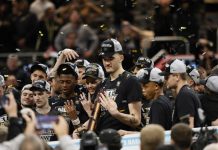DUBLIN, Ohio — Jack Nicklaus is rarely at a loss for words no matter the subject, except for those occasions when he knows as much as anyone. And then he waits.
One of the topics Tuesday at his Memorial Tournament was how often players from his era would help each other with their games while competing against each other, and whether that happens enough today.
Nicklaus hasn’t played against top competition since he crossed the Swilcan Bridge one last time at St. Andrews in 2005 and made a birdie on the final hole (of course) at the British Open.
He still pays attention. He remains a relevant voice.
“I watch all the guys,” Nicklaus said. “We had 30 kids down at the Bear’s Club that I see all the time. I watch them constantly. I keep my mouth shut unless asked. But generally speaking, I see things all the time and especially I see it creep into their game. And then a lot of times they come to me and I say, ‘I saw this a couple month ago, but I didn’t want to open my mouth because I didn’t want to do that to you.”
Tiger Woods could appreciate that. During one of his early swing changes, he couldn’t open his locker at a tournament without envelopes of unsolicited advice falling to the floor. The late Jack Fleck once digressed in an interview that he was trying to get Woods’ phone number and that “if wants to be the best driver, call me.”
This was in 2007. Woods had won four of his last nine majors and was runner-up in two others.
Jordan Spieth still considers one of his favorite moments being outside the back of the clubhouse at Augusta National with Nicklaus and Arnold Palmer in 2014, his first Masters at age 20, listening to Nicklaus talk about how to play the course where he won six green jackets.
“He loves following golf, loves watching it and has his opinions on what guys need to work on or difference from when they’re playing well. He can see those little things,” Spieth said. “And if you ask him, he’s willing to help. I think that’s pretty cool.”
But it starts with a question.
“Typically when we run into him, he’ll kind of feel you out,” Spieth said. “And then if you’re searching, then he’ll offer advice.”
Xander Schauffele might need some advice if he’s still bitter about a short week at the PGA Championship, only his second missed cut in 15 majors.
Schauffele said his head wasn’t in the right place at Kiawah Island, mainly because he didn’t like the Ocean Course and his attitude affected his play.
“For me to miss the cut was a bit reckless and kind of stupid,” Schauffele said. “Just didn’t really like the course and moving forward, even if I don’t like a course, I’ve got to wash that out of my mind and move along.”
Nicklaus, the greatest of them all in the majors, can relate.
“Are you kidding? Sure,” Nicklaus said when asked if there were courses he didn’t like or didn’t suit him or kept him from preparing properly.
He mentioned Pecan Valley in San Antonio for the 1968 PGA Championship (missed cut) and Oak Tree north of Oklahoma City in the 1988 PGA Championship. He also mentioned never playing well at Royal St. George’s, and the record bears that out. Nicklaus either won or was runner-up at every British links except Royal St. George’s and Royal Troon.
That was on him.
“You’re not supposed to fit the golf course to your eye, you’re supposed to fit your eye to the golf course,” he said. “If you got one that doesn’t fit you, you’ve got to work a little extra hard to make it fit. That’s basically all it is.”
One that stings was Oak Tree, mainly because he had to stay over to work TV. Nicklaus said his wife, Barbara, took their youngest son to McDonald’s and brought back a sippy cup filled with orange juice and a note that read: “There is no excuse for not being properly prepared.”
“I’ve still got that cup,” Nicklaus said. “She’s absolutely dead right.”
Nicklaus spoke for nearly 40 minutes, and when his news conference ended, he hung around for 15 more minutes taking more questions and offering plenty of stories that ranged from the difference between he and Woods on closing out tournaments (“Tiger had more of a killer instinct,” he said) to the feeling of thousands of fans coming up the 18th fairway (he liked it at the British Open).
He also was asked if he had an easier time remembering good shots or bad ones. Nicklaus said he remembered the bad ones only if they kept him from winning.
“I don’t remember the good ones as much because I expected them to happen,” he said.
That wasn’t a boast. He made exceptions for those that ended spectacularly, like the 1-iron that hit the flagstick on the 17th at Pebble Beach when he won the 1972 U.S. Open.
Nicklaus won’t need to wait for anyone to ask his advice on how to hit a 1-iron. No one carries one anymore.
More AP golf: https://apnews.com/hub/golf and https://twitter.com/AP_Sports




